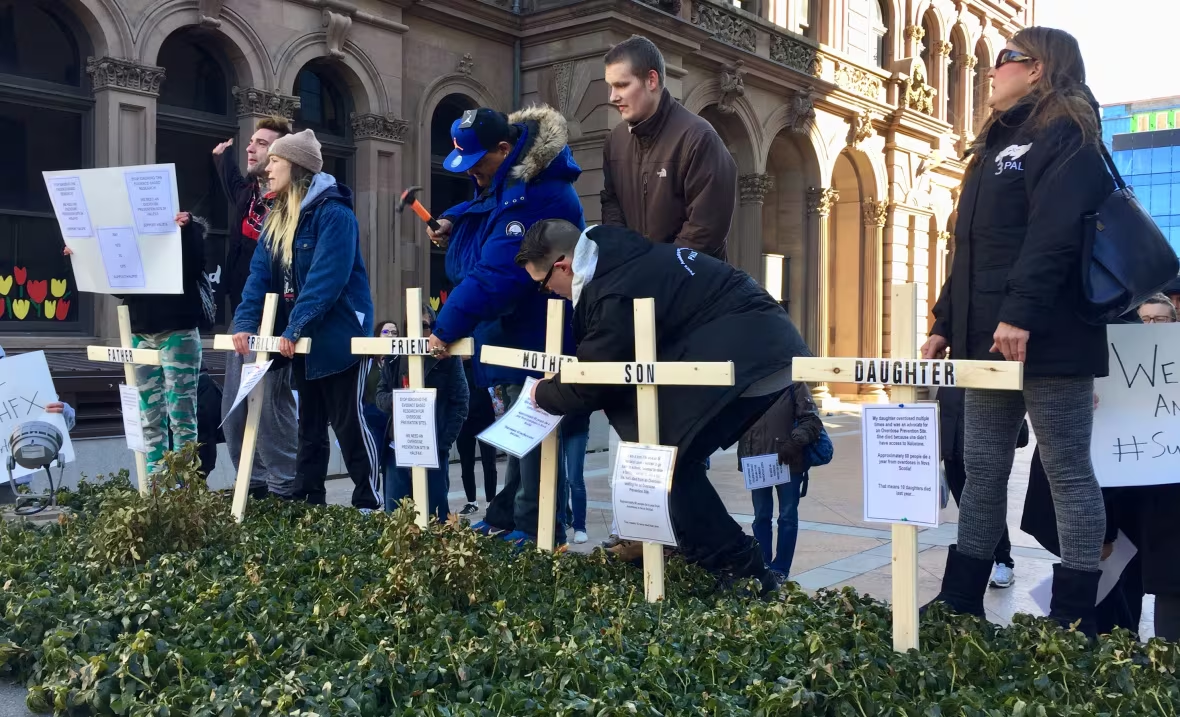Group wants to set up Halifax overdose prevention site 'one way or another'
'If someone is at risk of an overdose, we can save their lives,' says HaliFIX co-founder Matthew Bonn

A group hoping to establish an overdose prevention site in Halifax's north end says it can't be up and running soon enough, but there are rumblings of opposition in the neighbourhood.
Community advocates have formed the HaliFIX Overdose Prevention Society and hope to secure provincial funding. Co-founder and outreach worker Matthew Bonn said the group is also in the process of fundraising and applying for grants.
"People are using in the community anyway," he said. "People are carrying substances on them. I think by having a safe place for them to use, they can dispose of their equipment when they're done.
"There won't be any discarded using equipment in the area. If someone is at risk of an overdose, we can save their lives."
What exactly that site would look like will likely depend on funding. Bonn said the group is pondering setting up a tent where people can use sterile equipment under supervision.
Ideally, HaliFIX would like to use a section of the Direction 180 building at the corner of Cornwallis and Gottingen streets and equip it with four booths and an area where people could rest.
"We want to start small and prove there's a need and that it's just a health-care facility," Bonn said.

Health Canada has the ability to grant exemptions to allow banned and controlled substances if it determines there's an urgent public health need. Overdose prevention sites are usually set up by front-line staff who can administer opioid reversal drugs such as naloxone in the event of an overdose.
By contrast, supervised consumption sites are more permanent and often connect people with other health and support services. The federal process involves more extensive community consultations and can take much longer to set up.
In 2018, there were 60 confirmed or probable opioid-related deaths in Nova Scotia, according to government data. In the last eight years, the annual number of opioid-related deaths has ranged from 53 to 67.
For Bonn, who has been been substance-free for more than a year, those numbers are personal. Since 2012, several of his friends have overdosed each year. He knows many others, including a 28-year-old man who died who died in recent weeks.
Benefits of injection sites
Having a safe place to consume drugs can also reduce health-care costs in the long term, cut down the transmission of blood-born illnesses such as HIV and hepatitis, as well as injection-related infections, he said.
"This is a patient-initiated intervention," Bonn said. "I know if I would've had an overdose prevention site, I would've been linked to care a lot sooner, I wouldn't have gotten hepatitis C. I wouldn't have ended up in jail. It's a health-care intervention and meets people where they're at."
The site would be the first of its kind in Atlantic Canada and some people are questioning the impact it would have on the neighbourhood.

Patricia Cuttell-Busby, the executive director of the North End Business Association, raised concerns about the site's proximity to daycares, businesses and residential neighbourhoods, in a letter circulated to some residents.
Cuttell-Busby was unavailable for comment.
Irvine Carvery, a lifelong resident of the north end, said he believes safe injection sites have prevention and health benefits, but he worries the neighbourhood has become a "dumping ground" for services that address a drug problem that plagues the entire municipality.
Proposed location is 'very disrespectful,' says resident
He told Radio-Canada he's concerned offering a safe injection site would draw even more people from across the city to Gottingen Street.
"I find it very disrespectful that they would choose this area to put it in, given the long history of African-Nova Scotians in this area, and our main institutions," Carvery said.

On April 29, 902 Man-Up is hosting an evening meeting at the Halifax North Memorial Public Library to discuss the proposal. Shawn Parker, who is with the group, said it's an opportunity to hear from people who support and oppose the site. Originally, the meeting was to be held April 15.
"We're just going in open-minded to hear from everybody … A lot of times, the community doesn't get the chance to sit down and discuss things that are proposed for the neighbourhood," Parker said.
"I think it's really important that we have the open dialogue with the community to see how they feel."
Bonn said he would like to hold more extensive consultations with local organizations and the Minister of Health and to address the public's concerns. He worries with each week that passes, people's lives are at risk.
"One way or another, we're going to get this site up and running… We're hoping the province realizes that people are dying and an OPS, an overdose prevention site, is a health-care facility and a life-saving one at that," he said.
With files from Radio-Canada's Stephanie Blanchet